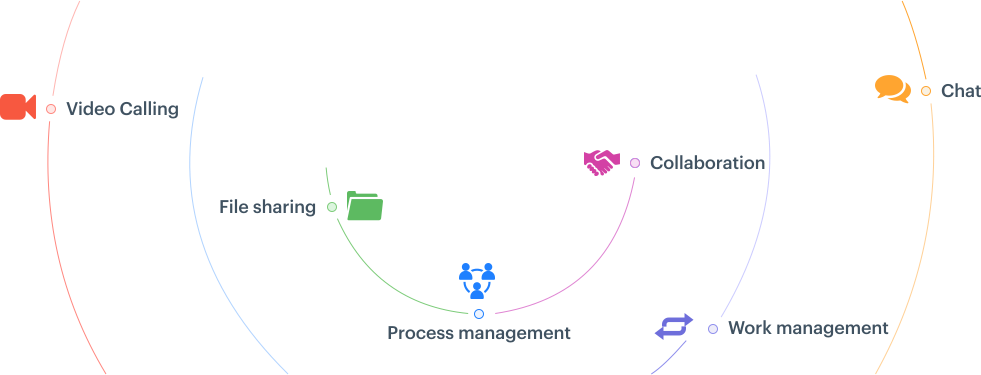Has Your Workplace Gone Remote?
Organizations worldwide are rapidly adapting to remote work models. It has become an essential requirement for business continuity and success in a world that is increasingly going virtual. Is your business ready to take the leap into remote work with a digital workplace?
What is Remote Work?
Remote work is a work methodology that does not require employees to be physically present at an office space in order for them to accomplish their work. Employees instead use digital tools to connect to work, collaborate with colleagues and accomplish tasks remotely.
Busting some common myths about Remote Work
Communication gaps?
In fact, remote workers are far more connected than ever. Communication in remote work has gotten a lot better, faster and more efficient with some amazing tools of collaboration that are among the best features of digital workplace platforms.
Lesser productivity?
The arrival of digital workplace platforms has heralded a phenomenal growth in the numbers of organizations going partially or fully remote. The contextual collaboration they offer is, in fact, one of the major keys in achieving higher productivity.
Lack of team bonding?
The truth is, with plenty of social, private and group-based channels for chat and collaboration, teams not only bond better in remote work, but they can do so across geographies. Imagine the power of collaboration organizations can unleash with these tools.
What are the benefits of remote work?
The number of people who work from home has increased by 140% since 2005. A bulk of those migrations to remote work happened in the last few years. By far, remote work has provided promising returns to both organizations and employees wherever it is practised. Let's explore some of the well known benefits of remote work.
Benefits to Employees
Health and Well-being
As home is a safe space, employees are more relaxed and able to better focus on work. No commutes, no tardiness and no boss breathing down their necks means less stress This results in healthier employees who accomplish more work.
Flexibility and Freedom
Employees no longer have to ask for permissions for doctors’ visits and special occasions. Attendance spikes as employees just need to get to their desk at home to complete their work. This leaves them plenty of free time at the end of the day.
Increased Morale
With a variety of factors that give employees more freedom to choose how they accomplish work, remote work offers employees a huge morale boost as it inculcates a trust based relationship with the employer rather than the fear based ones.
Benefits to Organizations
Increased Productivity
Across the board, one thing remains clear. Remote work models result in higher productivity. While the reasons for this uptick are many, organizations worldwide are taking note of the marked rise in employee productivity in remote work models.
Reduced Operating Costs
Physical offices are expensive to build, sustain and maintain. Surveys suggest that companies can save nearly $22,000 per employee annually by moving them to a remote work model. This takes into account all the costs involved in remote work.
Talent Retention
A variety of factors might be behind this phenomenon, but it is something managers are seeing across the world. Also, with remote work, organizations have access to a global talent pool that they would otherwise not have been able to access.
Effectively Managing Remote teams
A lack of direct supervision can sometimes lead to the feeling that it is hard to manage remote teams. This may be partially true, but it is also important to understand that there are many hacks to successfully manage remote teams once you address the fundamental problems. Let’s explore how.
Initiate regular check-ins
The No.1 problem with remote work is the lack of social interaction. To resolve this and help your teams become more comfortable with remote work, you need to interact with them on a regular basis to help them resolve issues and focus on work.
Focus on results, not work
In the office, it’s easy to see who’s working and who’s not. In remote work, it’s a little more complex to have that oversight. That’s why it’s important to focus on results rather than spending time monitoring whether employees are working.
Harness the power of technology
There are some amazing tools out there that make remote work a breeze. However, you need to decide whether to use multiple tools for work or a single unified platform that gives your employees everything they need.
Sustaining productivity and enhancing communication in remote work
You can maintain productivity in remote work by
-
Setting the right expectations
-
Being organized but also flexible
-
Optimizing meeting times
-
Tracking individual employee progress
-
Listening and providing solutions
-
Providing a good unified platform for remote work
Remote work offers vast scope in terms of enhanced productivity. Employees do not have to waste time commuting. Also, they get to work in a more relaxed environment where they can stay focused for longer. This increases the amount of time employees can dedicate to work. You can also leverage technology to enhance productivity.

Enhancing communication in remote work
A work platform that puts communication and collaboration in focus is essential for remote teams to perform effectively. However, it is important to not mistake the need for better communication as another tool you should just buy and expect your employees to use. Communication in remote work requires finesse and efficiency.
Communicating better in remote work
-
Create social environments like the watercooler
-
Embrace regular check-ins and meetings
-
Encourage empathy
-
Regularize team-building activities
Developing a remote work culture
The success of remote work might depend on the efficiency of the tools you use, but it is influenced to a large extent by the culture within organizations and teams. Developing a remote work culture is crucial if you want to harness the benefits of remote work and the tools you invest in.
A remote work culture
-
Has an agile work culture at its heart
-
Moves from management to responsibility
-
Stresses on maintaining social connections
-
Places a lot of importance on happiness
Remote work tools
There are many tools floating around that help build remote teams, work structures and accomplish work remotely. However, most of them offer just parts of individual remote work abilities like chat, video conferencing, collaboration, work process, etc.

Challenges with common remote work tools
Switching and porting data between multiple apps leads to enormous losses of time. A typical remote worker might use a video conferencing app to meet with someone to discuss work and then have to log out and use a completely different application to chat, another one to write emails and an entirely different one to do the actual work.
Remote work tool challenges
-
Multiple tabs
-
Constant Switching
-
Lost time
-
Productivity losses
-
Searching for information
A digital workplace is the ideal remote work platform
A digital workplace is a single unified platform for all types of work management and collaboration. It empowers employees to work from anywhere in the world without missing a beat. It lets remote workers communicate, pool resources, manage work and complete projects, all within a single digital platform that is focused on eliminating noise, enhancing productivity and delivering contextual collaboration.
A digital workplace lets you

Centralize all
work

Communicate
without switching

Collaborate
without issues

Focus on work
instead of tools

Access all the
information you need
Core features of an ideal
digital workplace for remote work
Apart from letting your remote workers collaborate effectively, a digital workplace platform also gives you features such as workflow processes, chat, live project boards and even integration with external third-party tools so you can keep all work humming within the platform.
Features of a digital workplace

Unified platform
for work

All the tools you
need

Powerful
analytics

AI based
automations

Social channels
and posts










